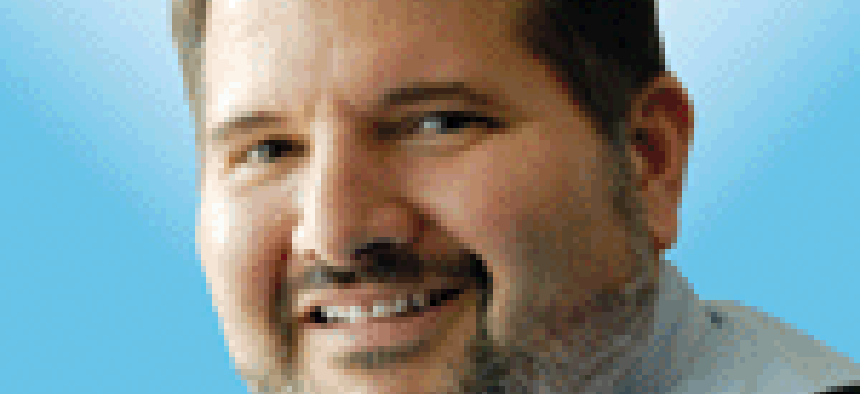From ship driver to senior exec, GDIT's Gilliland shares career advice

General Dynamics IT President Amy Gilliland shared her career path and along the way offered lessons on overcoming adversity, resiliency and not being afraid to take leap of faith.
As president of General Dynamics' Information Technology division, Amy Gilliland isn’t one for giving interviews or talking to the press. She is very much following in the footsteps of GD CEO Phebe Novakovic, who rarely speaks publicly beyond the company’s quarterly earnings calls.
Her reserved public persona shouldn’t be too surprising, given that it was Novakovic who hired Gilliland out of the Navy in 2005 to join the company’s strategic planning group.
But Gilliland did take the stage for a one-on-one interview at GDIT’s Women + Technology: EmpowHer event Tuesday and spoke eloquently about the challenges of leadership and her personal story along with her management philosophy. She delivered some tears, some laughter and plenty of examples of how to overcome obstacles, personal and otherwise.
The premise of that interview with GDIT Vice President Nisa Moore was to offer her story and advice on navigating the business world and overcoming barriers many women face in the workplace.
Gilliland started at the beginning when she was the child of single mother growing up in Maryland. Her great-grandfather cared for her while her mother worked. He taught life-long lessons about American values and the importance of giving back.
Then as a kindergarten student, she visited the Naval Academy on a school field trip and was hooked. She put a Navy pennant on her bulletin board to remind her of her goal.
“I’m grateful every day,” she said of her decision to attend the academy. Besides the quality of the education, two experiences stay with her.
First is surviving plebe year. She went from beach week as a new high school grad with “super long hair” to her first day at Annapolis when that hair was cut off at her ears. Then she marched in with the rest of the plebes and was told to look left and look right, then this: “One of you isn’t going to be here at the end.”
“That first year is a testament to grit, to never giving up when you think you aren’t going to make it or that you aren’t good enough,” she said.
The second experience was the lessons learned in her later years at the academy, when she led groups of incoming plebes.
“I didn’t do it very well but it was about inspiring people and toughening them up to believe they could do it,” Gilliland said. “I’m grateful for that opportunity and I use those lessons still today.”
Fast forward to the end of her naval career and her transition to the private sector. Gilliland knew she wanted to continue to serve the defense mission and was drawn to General Dynamics, but had some doubts.
“I was a ship driver and I did a lot of different things but I wasn’t sure how my experienced conveyed,” she said.
Gilliland interviewed with Phebe Novakovic, who wasn’t CEO at the time, and she offered her a job in strategic planning. “I didn’t know what that meant, but I believed in the company,” she said.
From clothes (no more uniforms), to learning the corporate language, to living without the military hierarchy, Gilliland said she struggled to adjust during that first year.
“I knew I was in the right place but I couldn’t figure out how I could add value,” she said. But obviously, in time she did.
Gilliland’s story about coming to GD and even her career path-- from the strategic planning role to becoming Novakovic’s chief of staff, then head of human resources and finally president of GDIT -- fit a theme that several speakers at the conference spoke about.
Women and men approach career choices differently. Men don’t worry as much about meeting all of the job qualifications, whereas women tend to want to meet all of the qualifications before they even apply.
Gilliland warned against this.
“Don’t pay that much attention to the qualifications,” she said. Her advice: know what the job is supposed to be, figure out who talk to and tell that person you are the right person for the job.
“But it’s terrifying,” she admitted. “I have not been qualified for any job I’ve had. Not 10 percent.”
That drew laughs, but you could tell she wasn’t joking.
“Take that first plunge and the more you open yourself to vulnerabilities and prove to yourself that you can succeed, it breeds confidence going forward,” she said. “Lead the bigger life. It is so rich.”
Another bit of career advice she offered was something she called “intellectual humility.”
“It gives me permission to not know everything,” she said. “You don’t need all the technical expertise for a job but you surround yourself with great people who have the expertise.”
In other words, it is OK to say you don’t understand or don’t know something.
“That admittance, that you don’t have to be the expert, is freeing,” she said.
NEXT STORY: Coming Summer 2020: Big GSA's schedule changes
